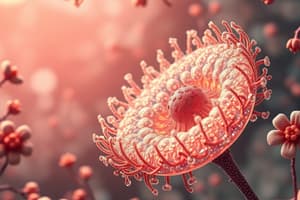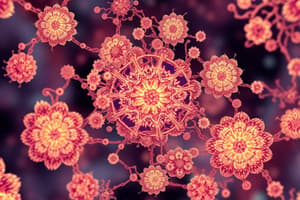Podcast
Questions and Answers
What are the primary characteristics of prokaryotic cells?
What are the primary characteristics of prokaryotic cells?
- They are always larger than eukaryotic cells.
- They lack membrane-bound organelles. (correct)
- They have a membrane-bound nucleus.
- They contain multiple chromosomes.
Which of the following statements about isotopes is true?
Which of the following statements about isotopes is true?
- Isotopes are solely used in organic chemistry.
- Isotopes have the same atomic number but different atomic masses. (correct)
- Isotopes have different numbers of protons.
- Isotopes have identical physical and chemical properties.
What distinguishes noble gases from other elements in the periodic table?
What distinguishes noble gases from other elements in the periodic table?
- They are highly reactive.
- They exist in liquid form at room temperature.
- They have filled valence electron shells. (correct)
- They possess only one electron.
What is the outcome of dehydration synthesis in macromolecule formation?
What is the outcome of dehydration synthesis in macromolecule formation?
Which of these defines the concept of a population in biology?
Which of these defines the concept of a population in biology?
Flashcards
Prokaryotic Cell
Prokaryotic Cell
A simple cell lacking a nucleus and membrane-bound organelles. Their DNA is located in a region called the nucleoid.
Eukaryotic Cell
Eukaryotic Cell
A complex cell with a nucleus and membrane-bound organelles. Their DNA is enclosed within the nucleus.
Dehydration Synthesis
Dehydration Synthesis
A chemical reaction that joins monomers together to form polymers by removing a water molecule.
Hydrolysis
Hydrolysis
Signup and view all the flashcards
Carbon's Uniqueness
Carbon's Uniqueness
Signup and view all the flashcards
Study Notes
Introduction
- Scientific method
- Prokaryotic vs. Eukaryotic cells
- Characteristics of prokaryotic cells
- Characteristics of eukaryotic cells
- Themes in biology
- Common structures in living things
- Biological organization
- Domains and their characteristics
- Kingdoms and their characteristics
- Factors influencing an organism's location
- Nucleotide composition
- Definitions of species, population, community, ecosystem, biome
- Charles Darwin and natural selection
- Taxonomy
Chemistry
- Subatomic particles of an atom and their charges
- Atomic number
- Atomic mass (weight)
- Characteristics of noble gases
- Isotopes
- Influence of subatomic particles on an atom
- Types of chemical bonds and their descriptions
- Maximum number of electrons in the outermost energy level (valence shell)
- Definition of electronegativity
- Density of ice compared to liquid water and its significance
- Properties of water
- Bond influencing water properties
- Definition of an acid
- Definition of a base
- Man-made molecules contributing to acid rain
Macromolecules
- Uniqueness of carbon
- Definition of dehydration synthesis (what's removed)
- Definition of hydrolysis (what's added)
- Components of a triglyceride
- Difference between unsaturated and saturated fatty acids
Studying That Suits You
Use AI to generate personalized quizzes and flashcards to suit your learning preferences.




